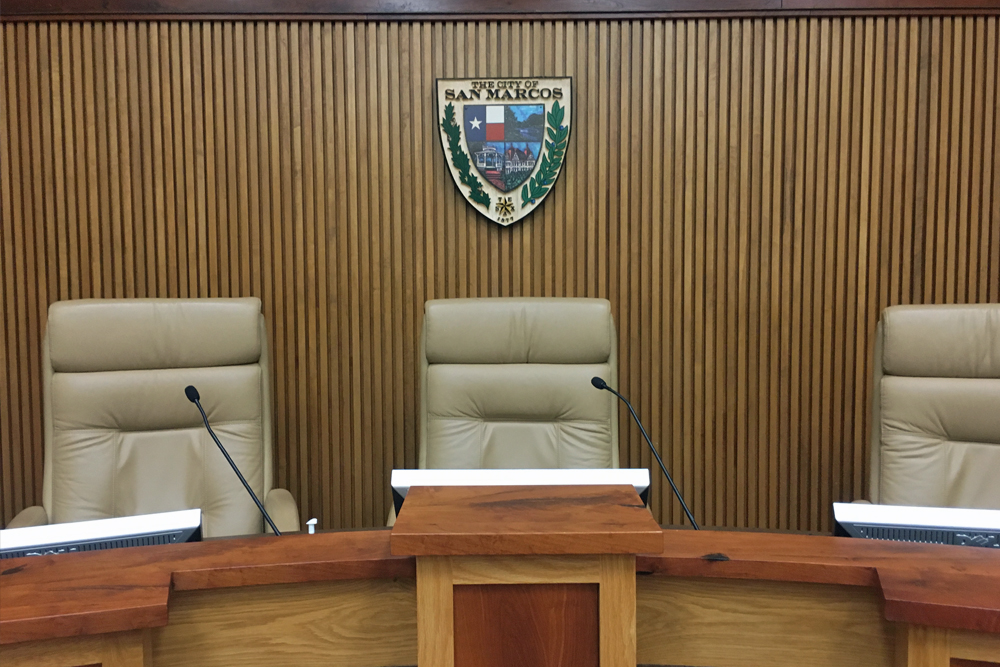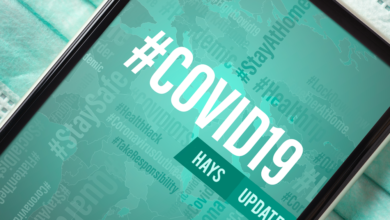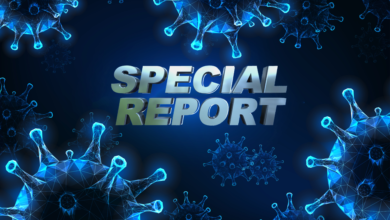
SMTX City Council To Consider Joint Letter Calling Governor To Take Action
On June 11, the San Marcos City Council will consider a joint letter to Governor Greg Abbott calling on him and the state to take specific actions related to COVID-19.
The City of San Marcos released the agenda for the special meeting on Friday, June 5, at 3:00 PM.
The letter, requested by councilmember Maxfield Baker, requests Abbott look “to alleviate the disproportionate impact of COVID-19 on Latinx Texans and people of color.”
“Public health experts have confirmed that this is mainly because Latinx and people of color are overwhelmingly working on the front lines,” the letter states. “Inaction to protect our frontline workers will result in predictable consequences, including loss of life.”
According to the Department of Texas Health, 39.8% of the confirmed cases are Hispanic Texans, 27.5% are white, and 15.9% are black.
On Monday, June 8, the Hays County Health Department began reporting ethnicity and race data for local COVID-19 cases.
*The information in the table was provided by Hays County. Corridor News has asked for clarification on the tables data but has not received a response.
|
Ethnicity |
Female |
Male |
Total |
Percentage of Cases |
|
Hispanic |
133 |
142 |
276 |
59.3% |
|
Non-Hispanic |
84 |
55 |
139 |
29.9% |
|
Not Specified |
36 |
14 |
50 |
10.7% |
|
Total |
253 |
212 |
465 |
|
|
Race |
Percentage of Cases |
|
American Indian |
0 |
|
Asian |
0 |
|
Black |
2% |
|
Native Hawaiian/Pacific Islander |
0 |
|
White |
81% |
|
Not Specified/Unknown |
17% |
*The information in the table was provided by Hays County. Corridor News has asked for clarification on the tables data but has not received a response.
The letter lists five items Baker is proposing the council call on the state to take action on but doesn’t fully explain how it will help regarding the virus.
“1. Expand Medicaid: Texas is the most uninsured state in America. The Latinx community lacks health insurance more than any other major population in Texas. It is disturbing that you continue to refuse these federal health care dollars during the COVID crisis.”
Medicaid is a benefit program for individuals in need of health care/insurance assistance whose financial situation would be characterized as low income or very low income.
An applicant must be a resident of the State of Texas, a U.S. National, citizen, permanent resident, or legal alien.
They must also “be either pregnant, a parent or relative caretaker of a dependent child(ren) under the age of 19, blind, have a disability or a family member in the household with a disability or be 65 years of age or older.”
The maximum income level per year for households, to qualify, is $25,265 for one person with an additional $8,870 per additional person in the household.
Texas Medicaid is part of national healthcare coverage providing free or low-cost care to populations based on income and family size.
According to Medicaid.gov, individuals generally must be either a citizen of the United States or certain qualified non-citizens such as lawful permanent residents.
“2. Have the Attorney General drop the lawsuit that is blocking paid sick time policies. Paid sick time would be guaranteed for all workers in Austin, Dallas, and San Antonio if it were not for the state’s lawsuit. Paid sick time is more important now than ever.”
Several cities, including Austin, have attempted to pass ordinances requiring employers within their jurisdiction to pay employees for sick leave.
However, state law does not mandate employers to provide paid sick leave, although some companies have personal policies to provide the benefit to their employees.
The State of Texas and plaintiffs in the lawsuit have argued that local ordinances mandating paid sick leave are unconditional because they raise the minimum, which has been set by the State Legislature already.
Plaintiffs in the injunction on paid sick leave argued the ordinances are unconstitutional because the Texas Constitution prohibits cities from passing ordinances that conflict with state law.
The constitution does not prohibit employers from providing paid sick leave to their employees as a benefit, but it does not require they do so.
Throughout Texas, a number of businesses have been forced to close their doors permanently due to the economic and financial impact of COVID-19.
Hospitals such as St. David’s HealthCare have been forced to cut pay for some workers.
In late May, Baylor Scott & White announced the layoff of approximately 1,200 workers, 3% of their workforce due to economic damage caused by COVID-19 restrictions.
The healthcare system said it was expecting furloughs and pay cuts as well.
While employees would be able to receive paid sick leave, it does not guarantee people of color or Hispanics from catching COVID-19.
It could also cause more businesses to lay off or furlough workers during the economic slump caused by the pandemic.
Currently, only three Texas cities are known to have attempted to implement ordinances requiring paid sick leave.
But it’s possible other municipalities may follow their direction if a court decides to rule the ordinances constitutional.
“3. Use the Economic Stabilization Fund (a.k.a. Rainy Day Fund) to provide immediate and continued financial relief to working-class families, regardless of immigration status. Doing so will lead to fewer people being forced to return to work if they are vulnerable or at-risk.”
According to the Texas Comptroller, Texas has the largest ESF or Rainy Day Fund in the nation. At the close of Fiscal Year 2016, the fund’s balance was $9.7 billion.
The Legislative Budget Board noted the balance of the fund to be $11.0 billion in 2018.
The Texas Tribune reported that the fund’s current balance is $10.2 billion, and the Texas Legislature widely agreed it would tap into the fund at the next session in January 2021.
The Rainy-Day Fund was created in 1988 through a vote by Texas voters; use of the fund requires a vote by at least Texas lawmakers in order for funds to be tapped into.
Lawmakers tapped the fund last year for a series of large, one-time expenditures.
According to a report by the Austin American-Statesman, Abbott and top elected state officials could redirect approximately $3 billion of the funds allocated from the ESF for flood mitigation and other relief initiatives.
The Comptroller’s Office said the $3 billion is what remains of the $6 billion originally appropriated from the Rainy-Day Fund in 2019.
However, it is unclear how the use of the rainy day funds would help prevent infection of Hispanics and people of color.
Texans of all ethnicities risk catching COVID-19 on a daily basis to purchase the basic necessities for their families and themselves.
“4. Nullify SB4, the “Show Me Your Papers” law. Because of your law, many immigrants are too afraid to seek critical medical interventions or public assistance for fear of being separated from their families.”
The controversial Senate Bill 4 passed in 2017; the bill allows police to ask a detainee or arrestee about their immigration status, including drivers and passengers who have been pulled over.
Medical professionals cannot deny services to an individual for any reason.
While many people may share the fear of being reported, the Health Insurance Portability and Accountability Act (HIPPA) protects the private health information of all individuals under medical care.
In addition, SB4 does not grant medical professionals the authority to ask about an individual’s immigration status, and medical professionals could not release personal identifying information to law enforcement or immigration authorities without a court order.
“5. Support Texas municipalities’ efforts to manage the COVID crisis. There is no “one size fits all” solution, municipalities should be permitted to enforce CDC guidelines and emergency protocols that will most protect and benefit their unique situations and constituents, which for San Marcos includes a large percentage of Latinx and low-income households. We must be supported in our efforts to save lives and prevent further devastation to these communities.”
As Abbott began reopening Texas, his executive orders withdrew municipality and county officials’ discretion to establish more strict restrictions at the local level.
Local officials have been required to follow the state orders to the letter.
According to state and federal health officials, Abbott’s orders fully comply with CDC guidelines and emergency protocols.
Additionally, according to the county, the City of San Marcos nor its city council members have been informed of the race or ethnicity of the two victims who died of COVID-19 in San Marcos.
While legal officials deemed it unconstitutional to require Texans to wear masks and other Personal Protection Equipment in public, Gov. Abbott and local officials have encouraged residents to do so.
Businesses and restaurants can require patrons, employees, and visitors to wear PPE in order to enter their establishment. However, such policies have a financial impact on individuals as well as places of business.
The proposed letter addressed to Abbott states that the city has “taken several steps at the local level to alleviate some of the economic burden faced” by residents; “however, there are many things outlined above that only you [Abbott] can legislate to help our community and they require your full and absolute attention.”
The letter and agenda item does not go into an in-depth explanation about how the proposed actions for Abbott will help minority populations, and everyone else on the front lines of the pandemic avoid catching COVID-19.
“Our local democracies are trying to take every action allowable under the law to address this reality,” the letter says.
On June 2, the San Marcos City Council approved a resolution directing staff to calculate the voter-approval tax rate of 8%.
The council discussed raising utility franchise fees from 7% to 8% to help with revenue shortfalls caused by COVID 19.
Earlier into the pandemic, the council voted to waive all late fees for residents’ utility bills.
The council will convene Thursday, June 11, at 4:00 PM to discuss the item after an update from staff on the COVID-19 pandemic.
COSM CC Letter to Gov Abbott




